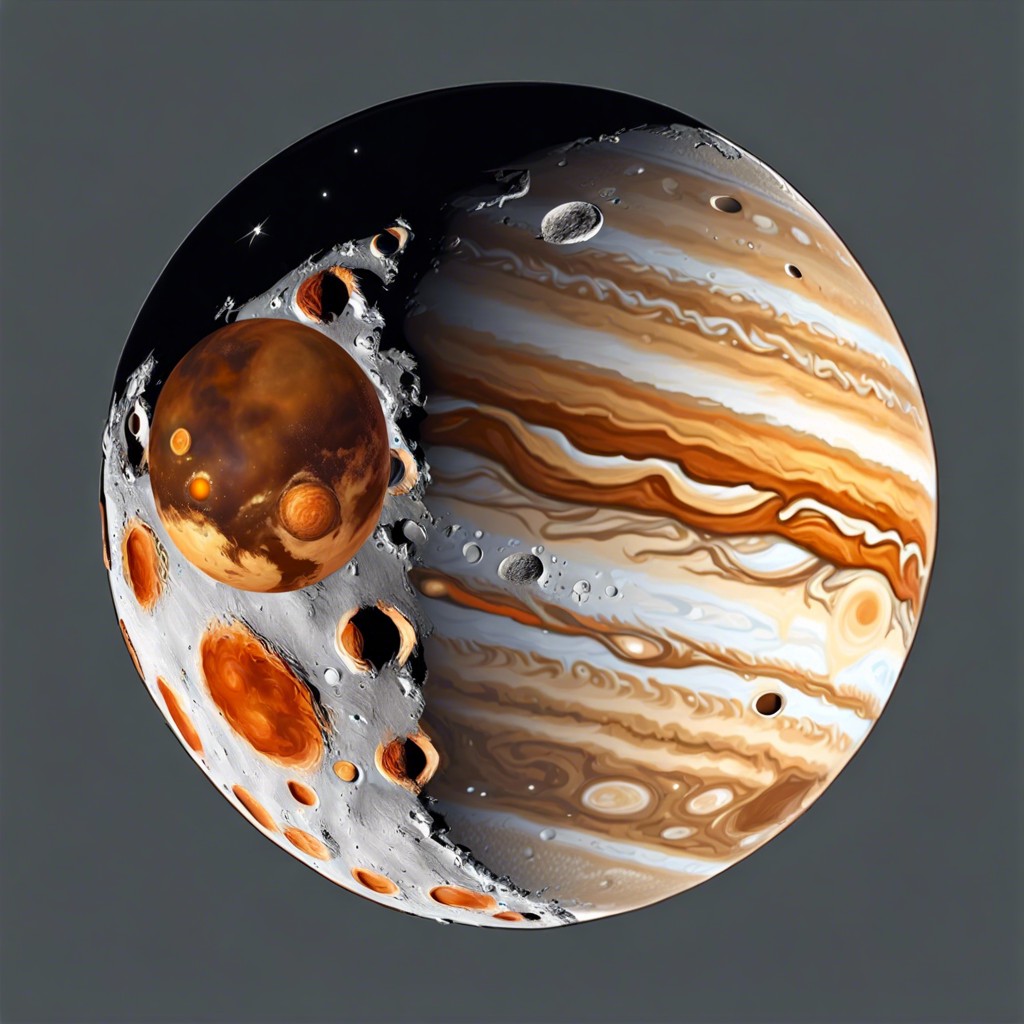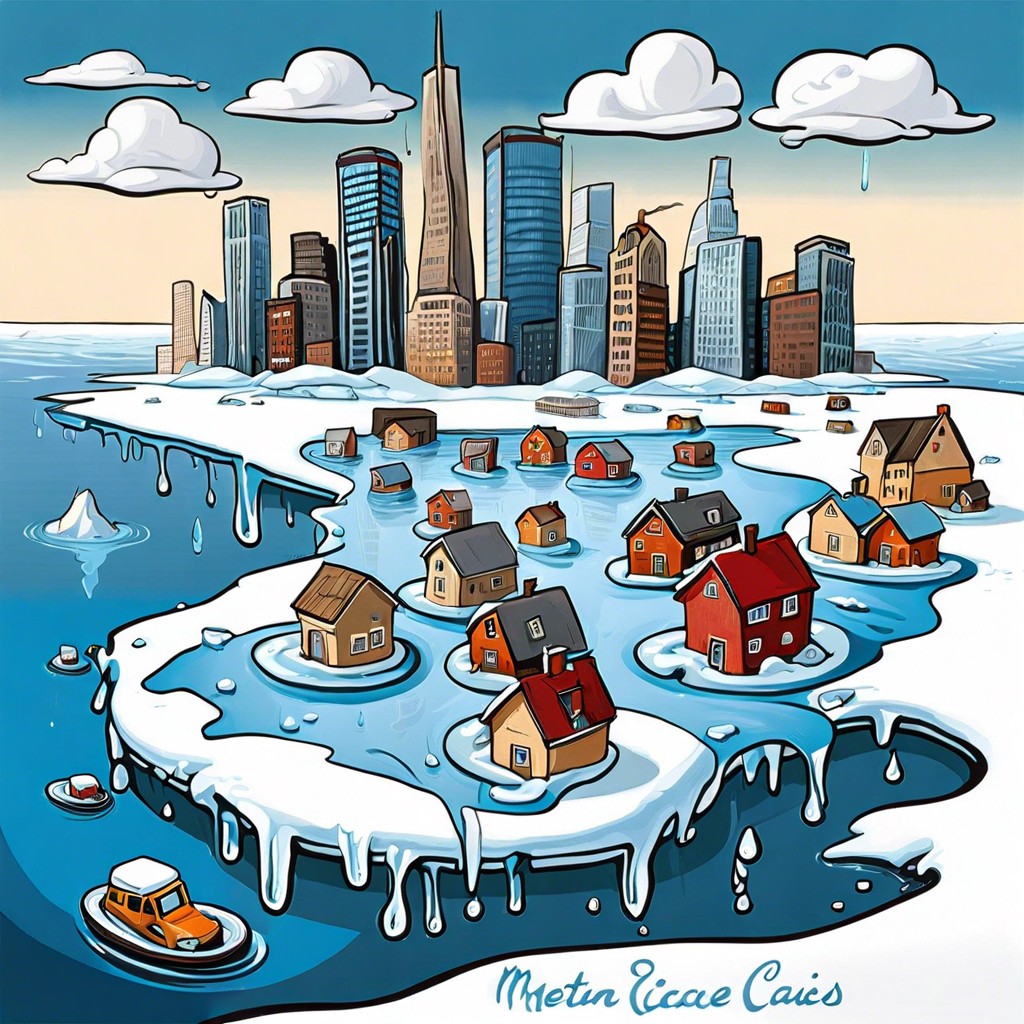You’ll learn how having Jupiter as our moon would create both spectacular sights and catastrophic challenges for Earth.
Imagine looking up at the night sky and seeing a gas giant the size of Jupiter hanging there like an overzealous cosmic chandelier. This celestial scenario would do more than enhance your stargazing; it would be an astronomical remix, shaking up Earth’s tides, orbit, life, and even climate. Intrigued? Keep reading for a deep dive into how this interplanetary dreamscape would reshape our world, one massive gravitational pull at a time.
Key takeaways:
- Tidal effects: Mega-waves, tsunamis, tectonic chaos, coastal relocation, disaster movie.
- Changes in night sky: Light show, eclipses, celestial selfies, no darkness, planetary extravaganza.
- Impact on Earth’s orbit: Orbit wobble, harsh seasons, sunlight changes, seasonal unpredictability.
- Effects on life and climate: Unpredictable weather, extreme surfing, ecosystems struggle, cockroaches thrive, magnetic field interference.
- Gravitational influence: Extreme tides, seismic activity, axial tilt changes, gravity-induced roller coaster.
Tidal Effects

Imagine surfing on waves that reach the height of skyscrapers. Sounds thrilling, right? With Jupiter as our moon, tidal waves wouldn’t just be a weekend getaway adventure; they’d be a daily disaster movie.
Jupiter’s immense gravitational pull would cause tidal forces vastly superior to our current moon’s gentle tug. Coastal areas? Probably history. Cities near the ocean would need to relocate. Permanently.
Let your imagination run wild. Massive tides would dramatically alter coastlines, possibly reshaping entire continents. And don’t get me started on the unleashed tsunamis. The sheer force would make surfing a death-defying stunt.
Not just water, even Earth’s crust would feel the pinch, literally. Increased tectonic activity could lead to more frequent earthquakes and volcanic eruptions. So, while mega-waves might sound like fun, the reality would be a constant battle against planetary chaos.
Changes in Night Sky
Imagine stepping out one evening and instead of a familiar, comforting moon, you see Jupiter’s colossal form dominating the sky. Mind-blowing, right? Here are a few things that would change:
First off, nights wouldn’t be dark anymore. Jupiter’s reflective clouds and many dazzling moons would create a light show worthy of Vegas. Sleeping in complete darkness? Forget about it.
Star-gazers, take note. Jupiter’s massive presence would overshadow constellations. Orion? What Orion? Trying to spot any star would be like looking for a specific grain of sand in a glitter factory.
Astrophotographers would have a field day, though. Imagine capturing those swirling gas giants and their colorful storms up close. Instagram would implode from all the celestial selfies!
Lastly, let’s not forget the eclipses. An eclipse involving Jupiter and Earth would be a spectacular cosmic event, casting colossal shadows and amazing patterns.
So, our night sky would transform from a canvas of twinkling dots into a planetary extravaganza!
Impact On Earth’s Orbit
Earth’s path around the Sun would resemble a dance choreographed by someone who can’t decide between ballet and breakdancing. Jupiter’s massive gravitational pull would nudge our orbit, causing a wobble, kind of like driving a car with a wobbly wheel.
Consider the seasons. Our lovely four-season rhythm might turn into an unpredictable tango. Winters could get harsher, summers unbearable, and spring? Well, it might just become an imaginary friend we talk about but never see.
And let’s not forget the Sun. Jupiter’s presence would subtly change how we receive sunlight throughout the year, affecting everything from crop cycles to our suntanning routines.
Effects On Life and Climate
Firstly, having Jupiter in our backyard would mess up Earth’s climate like a teenager at their first unsupervised party. Expect wild, unpredictable weather patterns, shifting oceans, and a climate that can’t make up its mind.
The gravitational pull from Jupiter would wreak havoc on our oceans, creating gargantuan tides. Picture the world’s most extreme surfing. And then imagine what would happen when those colossal waves hit the coast. Not the ideal beach day.
Jupiter’s magnetic field would be another curveball. It’s about 20,000 times stronger than Earth’s. This could shield us from some cosmic radiation. But it could also interfere with Earth’s own magnetic field, possibly causing compass needles to spin around like they’re in a disco.
And let’s talk about the knock-on effects on ecosystems. With climate going wild and oceans in turmoil, many species would struggle to survive. Food chains would be shaken up like a snow globe. Only the most adaptable organisms would thrive in this brave new world. Possibly cockroaches. Because, of course, cockroaches.
Gravitational Influence
Naturally, Jupiter’s gargantuan gravitational pull would be the biggest elephant in the room. Imagine the moon suddenly deciding it needed to hit the gym—only to turn into a celestial body-building champ overnight.
First, forget about those gentle ocean tides. With Jupiter, we’d have tidal waves so impressive they could be the new tourist attraction. Extreme tides would relentlessly reshape coastlines—not just twice a day but almost continuously.
Second, our dear Earth’s crust wouldn’t go unscathed. The sheer gravitational force might trigger increased seismic activity. Think earthquakes, volcanic eruptions, and tectonic chaos. Let’s hope you don’t live on a fault line.
Finally, Jupiter’s gravity would mess with the Earth’s axial tilt. Our nice, stable seasons could become erratic and unpredictable. Spring in December? Winter in July? Who knows?
Who needs a calm, orderly planet when you can live on a gravity-induced roller coaster?




